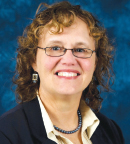Various studies at institutions in the United States and abroad have shown a substantial decline in cancer screening rates during the COVID-19 pandemic, suggesting that fewer cancers will be detected by screening and when they do manifest, they will be at more advanced stages. Indeed, cancer-related mortality rates have also increased during the pandemic.
However, there are opportunities to “bounce back” and improve screening rates for common cancers in 2021—most notably by oncologists partnering with primary care physicians and providing them with the tools they need to encourage screening, according to a presentation by Mary Reid, PhD, at the recent 2021 American Association for Cancer Research (AACR) Virtual Meeting: COVID-19 and Cancer.1 These tools would help primary care physicians to risk-stratify patients and recommend screening for higher-risk patients, noted Dr. Reid, who is Chief of Cancer Screening, Survivorship, and Mentorship at Roswell Park Comprehensive Cancer Center and Professor of Oncology.
“Primary care physicians are the major managers of cancer screening, and giving them the tools to start identifying high-risk people is critically important. They need support and education about higher-risk people. However, patients with pressing health-care needs, such as chronic diseases, would take precedence. If we use vaccine encounters as a tool, we can snap back,” she suggested.

Mary Reid, PhD
“Going forward, risk stratification will be very important. A person at higher risk should be prioritized for cancer screening. We need to provide education about this to community physicians, many of whom may not be as knowledgeable about the nuances,” Dr. Reid commented.
Background
More than 600,000 deaths were attributed to cancer in 2020. “Amid the COVID-19 pandemic, the infrastructure for cancer control and prevention was disrupted,” Dr. Reid emphasized. “Increased numbers of cancer-related deaths were due, in part, to lower screening rates and harder-to-deliver treatment,” she added.
During the first wave of the COVID-19 pandemic, death rates were increased by about 10% for breast cancer, 16% for colon cancer, and 5% for lung cancer, she explained.
“COVID-19 has had a multilevel impact on patients, health-care systems, and health-care practitioners. There is an overlap on the impact of these three domains. Patients were not given access to cancer screening, and there was a delay in care,” stated Dr. Reid. As a result, health-care systems suffered revenue losses, and many providers moved their areas of practice from cities and had changing responsibilities in the spring of 2020.
“The emphasis changed and is likely to remain changed,” Dr. Reid predicted. “This has been reported in many countries. Many cancer-related procedures were delayed, and patients did not present to primary care physicians with hallmark symptoms of cancer. This accentuated the disparity between patients with low socioeconomic status and higher socioeconomic status and isolated patients. Management and triaging were inconsistent,” she emphasized.
Before the COVID-19 pandemic, Roswell Park had a rigorous screening program that included many navigators in community settings and health clinics, providing education about breast, lung, and colorectal cancer screening.
In addition, between March 2020 and December 2020, 254 patients were screened for colon cancer, and 90 (35%) went on to colonoscopy. Between 2017 and 2019, 35% more people were screened per year, and 85% went on to colonoscopy. During the COVID-19 pandemic, Roswell Park turned to home-based colorectal cancer screening. “It remains to be seen how we will return to colonoscopy,” Dr. Reid said.
Almost no breast cancer screening was being done in April 2020, whereas in 2019, 850 Black women were screened for breast cancer at Roswell Park. “We had spent the past 5 years aggressively trying to screen this population, but nonessential procedures were cancelled in the spring of 2020,” she continued.
As of June 1, 2020, a robust breast cancer screening effort was reinitiated. However, with the second wave of COVID-19, the number of women screened decreased, although not down to the level of the spring of 2020.
‘Biggest Impact on the Most Vulnerable People’
“The COVID-19 pandemic has had the biggest impact on the most vulnerable people. This includes people with no insurance/underinsured, low income, from deprived neighborhoods, unemployed/underemployed, lack of access to care, and low health literacy. We know these populations are differentially impacted by access to cancer screening in general,” Dr. Reid said.
During the COVID-19 pandemic, disruptions in relationships between providers and patients have been particularly apparent in rural settings, where patients were unable to come in for clinic visits. In cities, screening was taking a back seat to dealing with patients who have chronic diseases. Once the brunt of the COVID-19 pandemic is in the past, strategies for Roswell Park would include reinitiating outreach screening programs for education and navigation as well as reestablishing trust with facilities and providers.
“The highest-risk populations should be targeted first. If we have limited time and resources, screening should be based on risk level,” according to Dr. Reid. “Imaging, which can be done locally, could be coupled with virtual visits, especially for those with normal results. This approach may decrease the risk associated with coming into facilities but keep patients on schedule, adjusting where they may undergo scanning, perhaps closer to home…. Home testing for colorectal cancer paired with detailed interviews has paid off. Until facilities are open, we will continue with home testing,” she said.
Creativity is important, Dr. Reid mentioned. For example, vaccination visits can be an opportunity to educate patients about cancer screening and reestablish relationships with communities.
“The oncology community must work with primary care physicians, in the short term, to tailor screening plans due to COVID-19. However, in the longer term, “we need to think about cost, priority based on risk, and begin to target screening again, so we don’t lose the gains we made in the past few years,” concluded Dr. Reid.
DISCLOSURE: Dr. Reid serves on the scientific advisory board of the Johnson & Johnson Lung Cancer Initiative.
REFERENCE
1. Reid M: Challenges to cancer screening during the COVID-19 pandemic. 2021 AACR Virtual Meeting: COVID-19 and Cancer. Abstract S02-01. Presented February 3, 2021.

